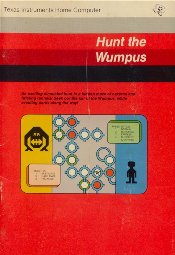
Hunt the Wumpus is a text-based adventure game developed by Gregory Yob in 1973. In the game, the player moves through a series of connected caves, arranged as the vertices of a dodecahedron, as they hunt a monster named the Wumpus. The turn-based game has the player trying to avoid fatal bottomless pits and "super bats" that will move them around the cave system; the goal is to fire one of their "crooked arrows" through the caves to kill the Wumpus. Yob created the game in early 1973 due to his annoyance at the multiple hide-and-seek games set in caves in a grid pattern, and multiple variations of the game were sold via mail order by Yob and the People's Computer Company. The source code to the game was published in Creative Computing in 1975 and republished in The Best of Creative Computing the following year.
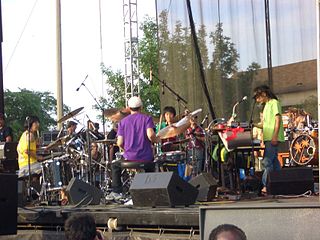
Boredoms is a rock band from Osaka, Japan formed in 1986. The band's sound is often referred to as noise rock, or sometimes Japanoise, though their more recent records have moved toward repetitive psychedelic rock, ambient soundscapes, and tribal drumming.

Yamataka Eye is a Japanese vocalist and visual artist, best known as a member of Boredoms and Naked City. He has changed his stage name three times, from Yamatsuka Eye, to Yamantaka Eye, to Yamataka Eye, and sometimes calls himself eYe or EYヨ. He also DJs under the name DJ 光光光 or "DJ pica pica pica", and has used numerous other pseudonyms.
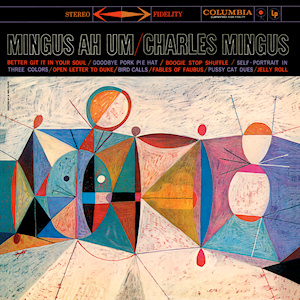
Mingus Ah Um is a studio album by American jazz musician Charles Mingus which was released in October 1959 by Columbia Records. It was his first album recorded for Columbia. The cover features a painting by S. Neil Fujita. The title is a corruption of an imaginary Latin declension. It is common for Latin students to memorize Latin adjectives by first saying the masculine nominative, then the feminine nominative, and finally the neuter nominative singular —implying a transformation of his name, Mingus, Minga, Mingum. The album was inducted into the Grammy Hall of Fame in 2013.
Seiichi Yamamoto is a Japanese musician. He was a guitarist for the noise rock band Boredoms, and has released records both as a solo artist and with several other musicians and bands. He has also composed the soundtracks to several films.

Vision Creation Newsun is an album by Japanese rock band Boredoms released by WEA Japan. The standard one-disc edition was released in Japan December 10, 1999, and in the United States the following year by Birdman Records.
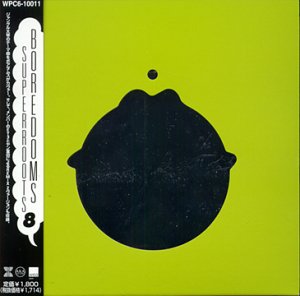
Super Roots 8 is the 7th installment in the Super Roots EP series by noise rock band Boredoms, released in 1999 by Warner Music Japan.

This is a discography of Boredoms, a Japanese experimental noise rock band. To date, Boredoms have released seven full-length studio albums, eleven EPs, three singles, two live albums, three videos, a cassette series, and five remix albums, in addition to their members' various side projects.

Chocolate Synthesizer is the fourth studio album by Boredoms. It was originally released via WEA Japan and Reprise Records in 1994. It was recorded in four days and mixed in a week. In 2013, it was re-released on vinyl by the California-based label 1972.

Lee Dong-hae, referred to as Donghae, is a South Korean singer, songwriter, composer and actor. He became a trainee under SM Entertainment after winning a prize at SM's Youth Best Contest in 2001. After four years of training, Donghae debuted as a member of boy group Super Junior in November 2005. Since then, he has risen to prominence due to the group's success on the Asian music scene and further participated in the group's project groups Super Junior-M, Super Junior-D&E. He is one of the first four Korean artists to appear on Chinese postage stamps.

Super Roots is the first installment of the Super Roots EP series by Japanese experimental band Boredoms, released in 1993 by WEA Japan, in 1994 by Reprise/Warner Bros. Records in the United States, and rereleased in 2007 by Very Friendly Records in the United Kingdom and Vice/Atlantic Records in the United States.

Super Roots 7 is the sixth installment in the Super Roots EP series by noise rock band Boredoms, released in 1998 by Warner Music Japan. The band included a credit for "Super thanks to the Mekons," whose song "Where Were You?" influenced the release.
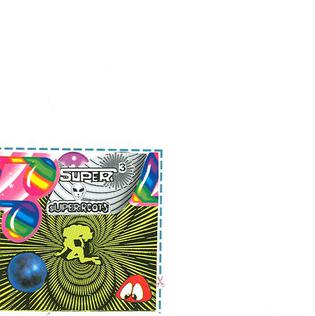
Super Roots 3 is the third installment of the Super Roots EP series by Japanese experimental band Boredoms. It consists of one song, half an hour in length, which has a repetitive rhythm throughout. It was released in 1994 by Warner Music Japan, and was reissued in 2007 by Vice Music and the Very Friendly label.

Super Roots 5 is the fourth installment in the Super Roots EP series by noise rock band Boredoms, released in 1995 by Warner Music Japan.

Rebore, vol. 0: Vision Recreation by Eye is a 2001 album by experimental noise rock band Boredoms. It is the final in the series of four remix albums of Boredoms material and was compiled and mixed entirely by Eye.
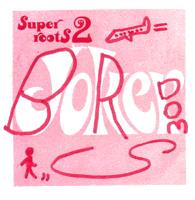
Super Roots 2 is the second installment of the Super Roots EP series by Japanese experimental band Boredoms. Released as a 3" CD, it was mailed to people in Japan who completed and sent a survey card enclosed with the Japanese release of Chocolate Synthesizer. Because of its short duration, it was the only Super Roots not to be rereleased by Vice Records in 2007.

Super Roots 10 / Ant 10 is the ninth installment of the Super Roots series of releases by Japanese experimental band Boredoms. The CD of the full version was released in Japan on January 28, 2009. On August 5, 2009, two 12" singles were released from this in Japan: Ant 10 Vol. 1 and Ant 10 Vol. 2. The American releases on Thrill Jockey were a double 12" single with enclosed 24" x 24" poster, which is now out of print, and MP3 downloads.
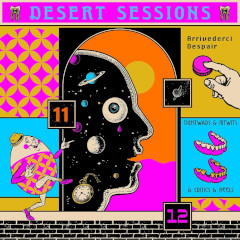
Vols. 11 & 12 is the sixth compilation album by the desert rock supergroup Desert Sessions, a side project of Queens of the Stone Age frontman Josh Homme. It is a compilation of the group's eleventh release, titled Arrivederci Despair and their twelfth release, titled Tightwads & Nitwits & Critics & Heels. It was released in October 2019, the group's first release after a 16-year hiatus. The album features contributions by various rock artists including Billy Gibbons of ZZ Top, Stella Mozgawa of Warpaint, Jake Shears of Scissor Sisters, Mike Kerr of Royal Blood, Carla Azar of Autolux, Les Claypool of Primus, Matt Sweeney, Matt Berry, and Libby Grace.















